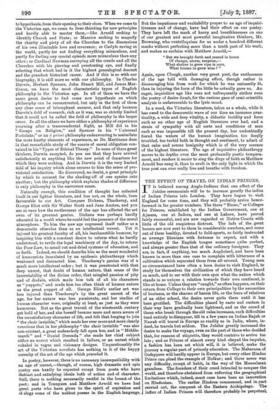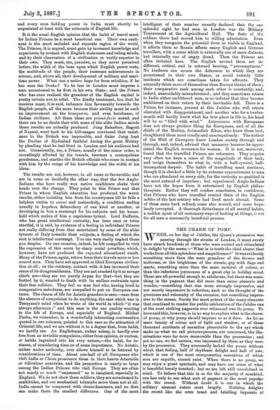THE EFFECT OF TRAVEL ON INDIAN PRINCES.
IT is believed among Anglo-Indians that one effect of the Jubilee ceremonials will be to increase greatly the influx of Indian. Princes into London. They have began to visit England for some time, and they will probably arrive hence- forward in far greater numbers. The three " Etons," or Colleges for Princes, established by the Indian Government, one at Ajmere, one at Indere, and one at Lahore, have proved fairly successful, and are now regarded at Native Courts with little of the old. suspicions distrust. The lads of the great houses are now sent to them in considerable numbers, and come out of them healthy, devoted to field-sports, as fairly instructed as average Etonians with fortunes to expect, and with a knowledge of the Engliah tongue sometimes quite perfect, and always greater than that of the ordinary foreigner. They are, in fact, if anything, too much Anglicised, and have been known in more than one case to complain with bitterness of a cultivation which separated them from all around. Young men so circumstanced have often a keen desire to visit England, to study for themselves the civilisation of which they have heard so much, and to see with their own eyes what the nation which stands in so unique a relation towards their own continent, is like at home. Unless they are "caught," as often happens, on their return from College to their own principalities by the necessities of business, or the charms of harem life, or the fears of relatives of an older school, the desire never quits them until it has been gratified. The difficulties placed by caste and custom in their way have gradually been lightened, and as the crowd of those who break through the old rules increases, such diffieultiea tend entirely to disappear, till in a few years an Indian Rajah or Nawab will travel in Europe as readily as in India, where, in- deed, he travels but seldom. The Jubilee greatly increased the desire to make the voyage, even on the part of those who decided that, for reasons of etiquette, they would. contrive to arrive too late ; and as Princes of almost every kind obeyed the impulse, a fashion has been set which will, it is believed, make the journey a-regular part of princely education. The Maharana of Oodeypore will hardly appear in Europe, but every other Hindoo Prince can. plead the example of Holkar ; and there never was any difficulty, except of habit, in. the way of the Mnssulman grandees. The founders of their. creed intended to conquer the world, and therefore- abstained from enforcing the geographical limitations which, indeed, must once have been an innovation. on Hindooism. The earlier Hindoos commenced, and in part carried out, the conquest of the Eastern Archipelago. The influx of Indian Princes will therefore probably be perpetual,
and every man holding power in India must shortly be acquainted at least with the externals of English life.
It is the usual English opinion that the habit of travel must for Indian Princes be a most beneficial one. Their own conti- nent is the most secluded and separate region of the world, The Princes, it is argued, must gain by increased knowledge and experience, by contact with English statesmen and ruling minds, and by their observation of a civilisation so vastly superior to their own. They must, too, perceive, as they never perceived before, the width of the base upon which English power rests, the multitude of the people, their immense achievements in science, and, above all, their development of military and mari- time power. What can a native hope for from rebellion, if he has seen the Docks ? To be lost in London must impress a man accustomed to be first in his own State ; and the Prince who has once realised the.grandeur of the English capital is pretty certain not to rebel. The kindly treatment, too, that he receives must, it is said, influence him favourably towards the English people, all the more because their civility must be such an improvement on the brusquerie, and even harshness, of Indian civilians. All these ideas are pried.facie sound, and there can be no.doubt that with some of the abler Indian minds these results are actually produced. Jung Bahadoor, Regent of Nepaul, went book to his hill-ranges convinced that resist- ance to the British was impossible, and Saler Jung kept the Durbar of Hydrabad faithful during the great Mutiny by pleading that he had lived in London and his audience had not. Occasionally, too, a Prince, usually of the minor order, is exceedingly affected by his travels, becomes a cosmopolitan gentleman, and startles the British officials who come in contact with him by.the range of his knowledge and the width of his ideas.
The results are not, however, in all cases so favourable, and are in some so decidedly the other way, that the few Anglo- Indians who have really won native confidence shake their heads over the change. They point to this Prince and that Prince in whom English education has produced the worst results, either isolating him from his countrymen till he falls a helpless victim to ennui and melancholy, a condition ending usually in hopeless debauchery of one kind or another, or developing in him a contempt for his subjects and his house- hold which makes of him a capricious tyrant. Lord Dufferin, who has great intellectual curiosity, has been once or twice startled, it is said, by evidence of a feeling in individual Princes not really differing from that entertained by some of the abler tyrants of Italy towards their subjects, a feeling of which the root is intellectual contempt. You can very easily neglect those you despise. On one occasion, indeed, he felt compelled to visit the expression of this scorn by sharp social penalties, which, however, have not produced the expected educational result. Many of the Princes, again, return from their travels more or less soured men. They have not approved or liked European civilisa- tion at all; on the contrary, contact with it has increased their sense of its disagreeableness. They are not crushed by it as savage chiefs are—they are too purely Aryan for that—bat they are fretted by it, wearied to death with its endless restraints upon their free volition. They feel as men feel who, having lived in comparative nakedness, are compelled to put on European cos- tume. The charm of life for Asiatic grandees is ease,—ease from the absence of compulsion to do anything, the ease which was in Tennyson's mind when he wrote of the world in which "it was always afternoon ;" and this ease is the one quality wanting to the life of Europe, and especially of England. Midhat Pasha, we remember, in a wonderfully interesting conversation quoted in our columns, pointed to this easels the attraction of Oriental life, and we are without it to a degree that, from habit, we hardly see. An Englishman, unless asleep, is hardly ever free from an invisible compulsion, either from opinion, or custom, or habits ingrained into his very nature,—the habit, for in- stance, of considering time as of some importance. No Asiatic, unless under authority, ever allows himself to be fettered by considerations of time. About one-half of all Europeans who visit India or China pronounce them in their hearts detestable or ridiculous countries, and the proportion is nearly as large among the Indian Princes who visit Europe. They are often not nearly so much "impressed" as is imagined, especially in England. We do not show them soldiers, they are accustomed to multitudes, and our mechanical triumphs move them not at all. India cannot be conquered with steam-hammers, and no fleet can make there the smallest difference. One of the most
intelligent of their number recently declared that the one splendid sight he had seen in London was the Military Tournament at the Agricultural Hall. The feats of tie soldiers there had moved him to willing admiration. Even when they recognise the potential force so visible in England, it affects them as Russia affects many English and German travellers, with a sense which is externally one of mere distaste, but internally one of angry dread. Then the Princes are often irritated here. The English around them are in- different, critical, and in outward bearing, "presumptuous." No kindness can secure the deference to which they are accustomed in their own States, or avoid entirely little incidents which are sometimes taken for affronts. They naturally think more of themselves than Europe thinks of them; their comparative rank among each other is constantly, and, indeed, unavoidably misunderstood ; and they sometimes return to India either embittered men, or so inflated that they become embittered on their return by their inevitable fall. There is a Prince, for instance, present at this Jubilee who will return ulcerated with disappointment, and another who fora twelve- month will hardly know what his true place in life is, his head will be so "filled with wind." Intercourse with Europeans does not always produce liking for Europeans, and of all the chiefs of the Mutiny, Azimoollah Khan, who knew them best, slaughtered them most cruelly and unscrupulously. The author of the Well of Cawnpore knew London society through and through, and, indeed, advised that massacre because he appre- ciated the English reverence for women. It is not, moreover, found that the travelled Princes are reformers. They acquire very often too keen a sense of the magnitude of their task, and resign themselves to what is, with a half-cynical, half- incompetent despair. The habit of travelling must continue, though it is checked a little by its extreme expensiveness to men who are plundered on every side, for the curiosity so gratified is the most natural of impulses ; but experienced Anglo-Indiana have not the hopes from it entertained by English philan- thropists. Rather they will confess sometimes, in confidence, that Princes who have travelled remind them of the English nobles of the last century who had lived much abroad. Some of them came back refined, some also soured, and some hope. lessly corrupted. A thorough disturbance of all mental habits, a sudden upset of all customary ways of looking at things, is not for all men a necessarily beneficial process.



































 Previous page
Previous page